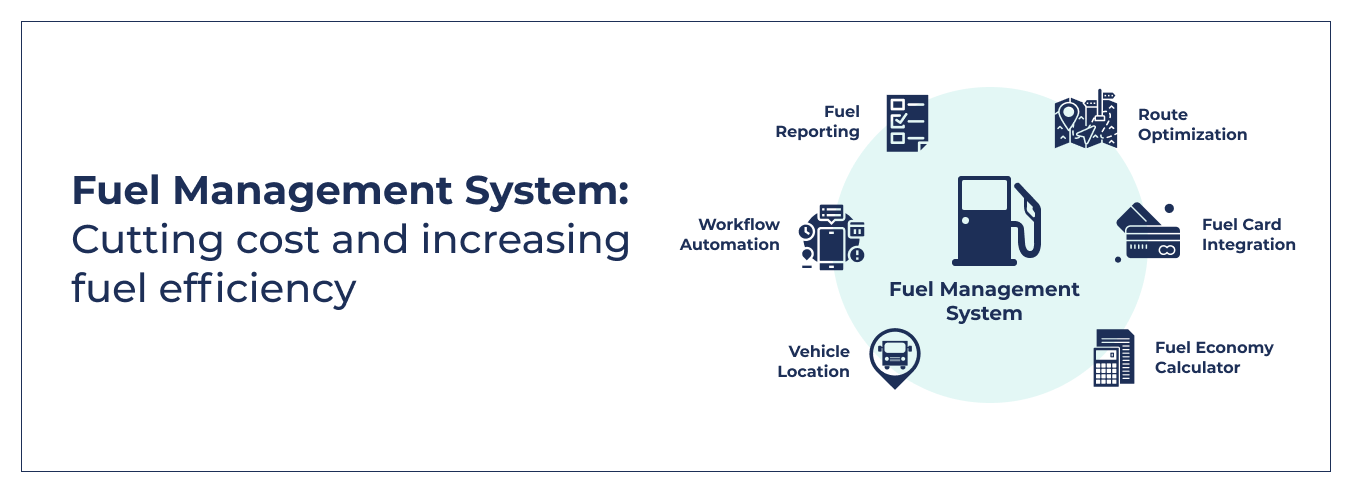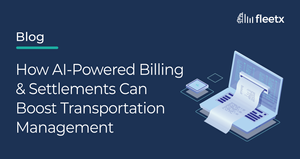
Businesses across industries today require logistics and transportation services to run their business efficiently. Whether it is a goods-producing company or service provider, they need a fleet of vehicles, large or small, depending on the scale of the business. As a result, logistics and transportation account for almost 40-50% of operating expenses for most companies. Fuel is the most significant logistics and transport operation component, accounting for 30-50% of the cost, depending on the industry. The rising cost of fuel has been hurting businesses for years and has become a significant pain point. Hence, it is the need of the hour for businesses to manage their fuel efficiency to bring down their operational expenses. This can be achieved using efficient fuel management systems and better fleet management.
What is a fuel management system?
As the name suggests, fuel management systems software is a technology-driven solution for private and commercial use. A fuel management system aims to manage and monitor fuel consumption for a vehicle or the entire fleet of vehicles. The Fleet fuel management system is part of the more comprehensive fleet management solution that is technology-driven software for efficient fleet management.
Fuel management systems are typically used by industries or companies operating a large fleet of vehicles for commercial transportation, including railways, airways, waterways, and roadways. Basically, any mode of transport requires fuel to run. Fleet fuel management system collects fuel-related data like fuel consumption, inventory, and purchase from all vehicles in the fleet. Then, using telematics and analytics-based tools, it processes that information and transmits it to the central server. Computerized software then converts this data into meaningful insights, which can be used for better fuel management and improving fuel efficiency for the entire fleet.
Fuel Efficiency and fuel management systems India
Fleet and fuel management systems are used extensively by the transportation industry, primarily to improve fuel efficiency. However, fuel efficiency is a very vague term that can be interpreted in various ways. In the context of transportation, fuel efficiency can be defined as how much distance a vehicle covers in one unit of fuel. In India, the most common fuel used for commercial vehicles like trucks is diesel, followed by petrol and CNG.
The unit of fuel efficiency in India is calculated as kilometers per liter(kmpl). The goal is to maximize fuel efficiency by maximizing the distance a vehicle could cover per liter of diesel or minimizing fuel consumption for the distance covered. In addition to this, the Bureau of Energy Efficiency, India, in 2017, has set fuel efficiency norms for commercial vehicles (CV) based on Gross Vehicle Weight (GVW) of 12 tonnes or higher. Hence, it has become necessary for manufacturers and transporters to improve vehicle fuel management for compliance with regulatory requirements.
In a nutshell, to briefly touch upon the need for a fuel management system for trucks and other vehicles, we can say,
- An electronic fuel management system can assist companies and transporters in improving fuel efficiency for their fleets to reduce operational costs.
- Fuel Management systems can be a tool for better compliance with regulatory requirements set by the government.
- Engine fuel management systems can provide insights into fuel consumption and usage to reduce fuel wastage.
- A smart fuel management system can help increase overall efficiency by assisting companies in optimizing driver behavior for better fuel management.
Understandably, not all aspects of fuel economy can be controlled. Transport is a fuel-reliant operation, and hence, consumption cannot be considerably reduced. However, better insights, monitoring, and management are made possible by fleet fuel management for trucks and fleet fuel management for cars. Companies can prevent fuel wastages by better managing issues like,
- engine idling
- fuel theft
- over-speeding
- fuel cost
- poor fuel reporting
- poor routing and navigation
- Improper vehicle maintenance, among others.
Fleet fuel management systems using technology and data helps companies manage such issues better and execute effective fuel management strategies. Let's look at some of how engine management systems can improve fuel efficiency for transport.
What issues do fuel management systems resolve & what are their benefits?
Earlier in this article, we understood how fuel management systems work and briefly had a look at a few uses cases for the same. Now, let's immerse into these use cases a bit more to understand how it can benefit companies looking for particular features in a fuel management system.
Get better fuel usage insights.
A fuel management system for fleet lets you see fuel data for the entire fleet at once to spot any problem or irregularities. Fuel usage insights offered by advanced fuel management system software like fleetx provides corresponding map location & time along with fuel insights for more transparent and complete analytics. Fleet managers can generate rich analytical reports on fuel transactions by fuel type, distance covered, efficiency, amount, and cost.
Reduce the risk of fuel theft & pilferage.
Some of the best fuel management systems help companies considerably reduce the risk of fuel theft, a common problem rampant across the industry. They collect and provide detailed historical fuel filling and theft records to users. It allows them to analyze fuel usage data minute-by-minute for all fuel usage points for each vehicle in the fleet. Such data will enable them to assess the amount of fuel stolen with the exact location, time, and other details of the fuel theft to support the claim. This can further help them improve operations by eliminating malpractices in their operational process.
Get real-time alarms and notifications.
The best fuel management system utilizes technology to offer real-time alarms and notifications if there is any deviation from normal fuel usage. For example, a sudden drop in fuel capacity or levels can be flagged, and fleet managers and drivers are notified. This helps them detect fuel thefts or poor engine performance, which can further be fixed before commencing a trip and avoiding unwanted breakdowns.
Detect early fuel wastage.
The combination of a Fuel management system and fleet tracking can better predict fuel wastage to improve fuel efficiency. Some of the best fuel management systems like fleetx equip their offering with advanced sensors and intelligent analytics to offer the vehicle's most accurate mileage and fuel consumption. It detects fuel wastage based on parameters such as engine idling, hard acceleration, and deacceleration, which, when detected and prevented, can save substantial fuel costs.
Easily track and manage fuel transactions.
Fuel management systems offer the service of tracking and managing fuel purchases efficiently for on-route vehicles. Drivers can easily log in all their fuel purchases and upload transactions to save the hassle of maintaining paper receipts that are perishable in nature.
How does automation promote more efficient fleet and fuel management?
The transportation industry has operated without transparency for decades, resulting in various operational inefficiencies and malpractices. Truck or car fuel management system software and fleet management brought much-needed transparency to the entire transport management system. In addition to that, automation has been a critical USP for fleet and fuel management software in the market today.
Automation plays a much more critical role when it comes to fleet management. Besides fuel management and monitoring, it has various other use-cases through which better fuel and fleet efficiency could be achieved. Let us look at automation applications for fuel and fleet management and how companies can benefit from them.
Automating fuel transactions and fuel reporting using a fuel management system
The purchase of fuel is one of the most significant expenses when it comes to transportation. When vehicles are on the route, drivers are often required to refuel several times.
Fuel cards and payment
Traditionally, drivers collect receipts for each refueling. At the end of the trip, fleet managers calculate and report the fuel expenses through receipts. Fuel cards like Indian Oil's XTRAPOWER Fleet Card are alternatives to cash receipt and payment, making it easier to transact.
Manual entry for fuel reporting
However, such a manual process to keep a tally of details required for better reporting like,
- date, time, & location of transactions
- purchase price of fuel per liter
- quantity purchased
- odometer readings before and after refueling
- level of fuel before and after refueling
Makes the process averse to malpractice which is a common practice in transportation due to lack of transparency.
Automated fuel management systems
Fuel management systems for the fleet automates all the processes above. For example, fleetx's fuel management system provides the driver with the option to log fuel data for each fuel purchase through fleetx's Driver app. Thus, it eliminates the risk of losing receipts. In addition to that, fuel data can also be uploaded for better analytics and reporting through fuel forms, manual importing from sheets, or integrating fuel cards with the fleet management system.
Using telematics data for fuel management
Data collected through the telematics system using the black box can also collect the data mentioned above and integrate it with the fleetx's fleet and fuel management system. In addition, the fuel management system also provides access to fuel level history reports with their corresponding locations & time. Such data can be analyzed to curb fuel theft and other refueling-related malpractices, thus, decreasing the fuel costs tremendously. In addition, various analytical reports such as Fuel usage over the trip with Fuel refill/theft data points help decide the fuel expenses per vehicle over different routes.
Monitoring driver behavior using fleet and fuel management system
Several factors define fuel efficiency for the fleet. The two most important factors responsible for better or worse fuel efficiency are driver behavior and vehicle maintenance. Let's look at how fleet and fuel management systems can collectively help monitor and improve these two aspects to improve fleet efficiency.
Driver behavior solutions are proven to cut fuel expenses by up to 10%. In addition, every vehicle can be optimized to provide maximum fuel efficiency. However, the way a driver drives the vehicle plays a significant role. Using driver behavior and analytics tools for fleet management, fleet managers can be notified about instances like,
- overspeeding and rash driving by drivers
- exhausted and overworked drivers
- poor driving performance
- unwanted stoppages
- hard acceleration and deceleration
- change in safety culture and compliance, among others
- engine idling
Prevents harsh events and engine idling
Such instances, especially engine idling, resulting in much higher fuel consumption, leading to poor fuel efficiency and higher operating costs. However, they can be prevented by employing driver behavior solutions and a fuel management system for better fleet management and maximizing ROI.
Predictive maintenance of vehicles could maximize fuel efficiency
Maintenance is another crucial factor that is often looked at when we talk about fuel efficiency. A poorly maintained vehicle will offer a much lower mileage and performance, affecting fuel its fuel efficiency. Hence, time maintenance of vehicles must be conducted to increase their life and operating efficiency, maximizing ROI.
However, keeping track of vehicle maintenance for such large fleets is can be challenging. Hence, fleet maintenance solutions can help fleet managers access real-time vehicle diagnostics and automate servicing and maintenance reminders. Moreover, real-time reminders can improve vehicular performance, ergo, improving fuel efficiency substantially.
How to go about fuel management integration for your fleet?
So far, we have established that fuel management systems and fleet management solutions are definitely beneficial for companies and transporters. However, how does a company integrate the available fuel management systems in the market? What is the fuel management system price, and how to choose the right one?
Let us look at the considerations a company has to make to choose the right fuel management system for their operation.
A fuel management system should offer simplified UI and process for logging and reporting fuel
Various technology-driven companies offer a variety of fleet management solutions, including fuel management. However, utilizing these needs to be simplified for drivers and fleet managers, which many companies fail to deliver. Popular fleet management solution from fleetx offers simplified UI and easily accessible fuel management system with ease of accessibility. It offers easy integration, management, and import of data, including receipts, fuel cards, and fuel forms for more user-friendly use.
A fuel management system should have a telematics-based ELD & sensors for better driver and vehicle management.
Although there are no restrictions on the number of hours truck drivers can drive in India, unlike the US, it is crucial to prevent overworking of drivers. Hence, telematics-based ELD and driver management tools sensors can help improve fleet productivity by making sure drivers are not overworked and exhausted. It reduces instances of poor driving, which increases fuel consumption. Hence, it is always a good idea to opt for fuel management systems that offer such features.
Conclusion
An efficient Fuel-management system is the need of the hour for companies and transporters. With fuel prices touching new heights, companies are forced to rethink their operations strategy to minimize consumption and maximize efficiency. Fuel management systems can be a great tool to manage fuel efficiency.
Further Readings
EVs are gaining pace in India with several initiatives and investments from both government and private sectors. Read about developments in the EV industry and how can they be a groundbreaking alternative to the fossil-fuel-driven transport industry in The state of the commercial EV industry in 2021 (fleetx.io), and What does the future of EV Fleet Management hold? (fleetx.io).
What is a fuel automation system?
Robotic or automated fueling involves using automation to eliminate manual work from the fueling process. A robotic arm fills the tank by opening the car's flap, removing the cap, picking up the fuel nozzle, and inserting it into the tank's aperture.
What is the best fuel management?
Best Practices for Fuel Management
*Put a tank monitoring system to use.
*Use a monitoring system for pumps.
*Educating Your Staff on the Latest Law.
*Recognize the Information Given and Take Action.








